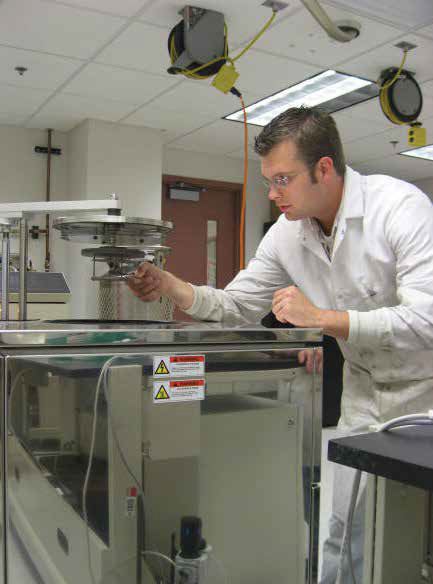Winter leads the way in ALD research
 |
Mark Salay, a former Ph.D. student of Winter's, conducts work in Wayne State's ALD lab. Salay is now employed at Applied Materials. |
Charles Winter doesn't want to make predictable discoveries. He wants to make waves.
"I don't want to make evolutionary steps; I want to make disruptive ones," said Winter, professor and associate chair of Wayne State's chemistry department. "Advancements that change the way people think about and do things."
Winter is a leading researcher in the field of Atomic Layer Deposition (ALD) a process for growing thin films using chemical compounds and the work done by his research team in the area of growing metallic films using his processes is leading to major advancements in the microelectronics industry.
Since its development in Finland in the 1970s, ALD has been recognized as a useful tool for developing thin films and improving microelectronic components such as transistors. Through ALD, films only grow a monolayer at a time, following the contours of the substrate and allowing manufacturers to calculate the film's thickness precisely.
"We recently discovered a general class of strong reducing agents, and we can now deposit metals by ALD that haven't been possible before, such as first-row transition metals and difficult metals like aluminum. This is having a very large impact on the field. It's early, but I'm optimistic that our reagents will become widely used in the microelectronics industry," Winter said.
Growing metallic films using ALD is a complex process. Currently, only three universities in the world Wayne State, Harvard and the University of Helsinki have vibrant research programs in this area. Winter said his ALD expertise and background as a synthetic chemist give him unique insight into this growing focus area.
"You have to make molecules that have a very specific set of properties, including thermal stability, volatility and high reactivity toward a second reagent to get the material you want," he said. "No one knows how to do that; you have to learn it by discovery."
Winter works closely with Wayne State's Technology Commercialization Office and industry partners to transition his discoveries to the marketplace, interacting with chemical suppliers, tool manufacturers and microelectronics fabrication plants to ensure that the research conducted in Midtown finds its way to end users.
Winter was recognized for his research at the 2014 ALD Conference in Kyoto, Japan, where he took home a Best Innovation Award for his paper, "Silyl Elimination Reactions in the Atomic Layer Deposition of Titanium, Zinc and Other Element Films." Never one to rest on his laurels, he said there is still a lot of work to be done.
"I hope that within five years we have ALD precursors and processes for all reasonable metals in the periodic table," Winter said. "We're on the right track, and providing that chemistry will be a huge service to the ALD world and the microelectronics industry."